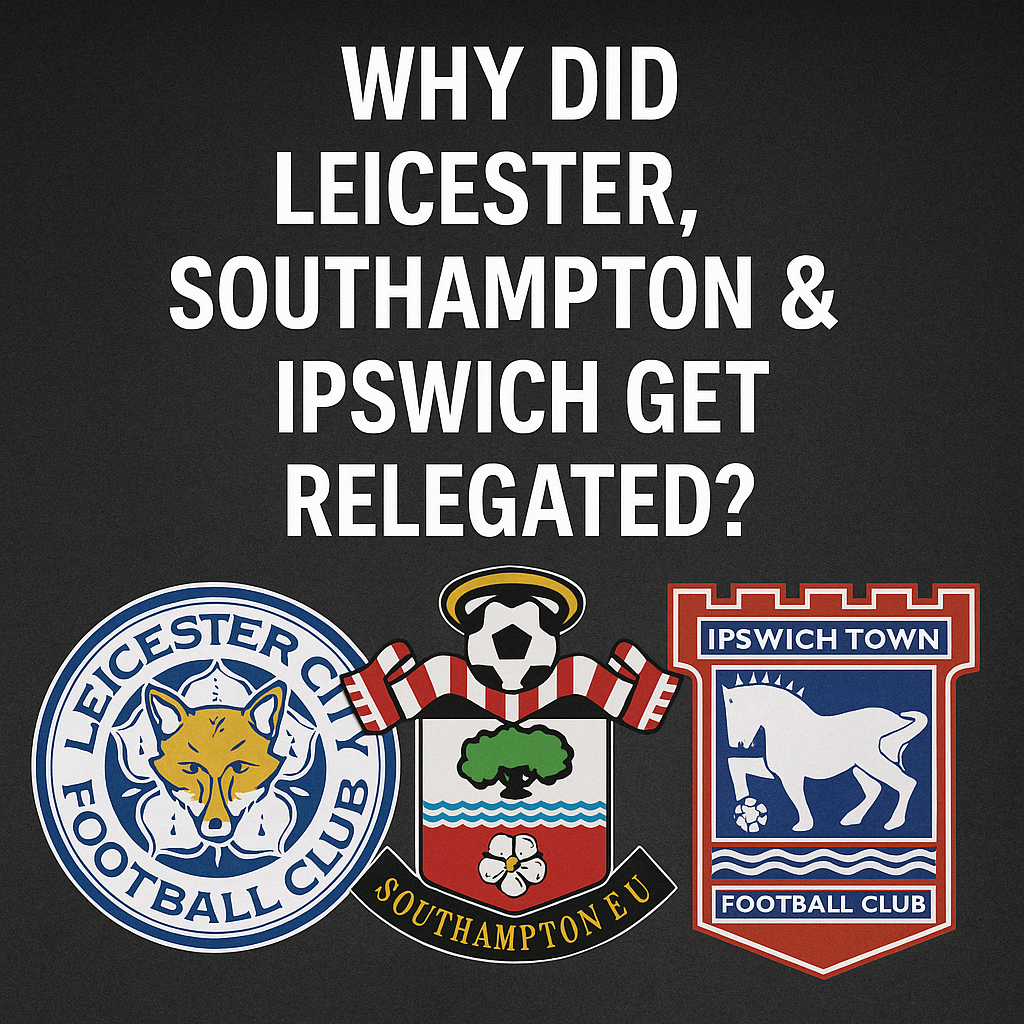The curtain has fallen on this season’s Premier League with the bitter reality of relegation for Leicester City, Southampton, and Ipswich Town. Each club’s drop to the Championship carries a distinct story — a complex mix of tactical missteps, managerial instability, squad limitations, and the harsh financial and competitive demands of England’s top tier.
This article dissects the multifaceted reasons behind their demotion, unpicking the threads that led to the unfortunate fall of three clubs with vastly different histories and expectations.
Leicester City: From Champions to Championship Battle
Leicester City’s relegation stunned many, given their remarkable Premier League title win just seven years ago. But the gulf between the 2015-16 fairytale and this season’s struggles is a reflection of deep-rooted challenges.
Managerial Instability and Tactical Regression
Since Brendan Rodgers’ departure in 2023, Leicester faced managerial turnover, disrupting team cohesion. New appointments failed to imprint a clear style or identity, leading to tactical inconsistency. Leicester struggled to balance defensive solidity with attacking intent, frequently losing shape in transitions. The lack of a defined game plan made them predictable and vulnerable to better-organized sides.
Squad Ageing and Recruitment Missteps
The core squad that once punched above its weight has aged, with limited reinvestment in young talent or high-potential recruits. The club’s transfer strategy lacked clarity, with some expensive signings failing to adapt to the Premier League’s pace and physicality. The recruitment disconnect between the board’s financial constraints and the need for Premier League-ready talent weakened Leicester’s competitive edge.
Defensive Vulnerabilities
Leicester conceded over 70 goals this season — a glaring issue. Defensive lapses, individual errors, and set-piece frailties contributed heavily. Goalkeeper uncertainty and lack of leadership at the back compounded the defensive woes.
Psychological Toll and Confidence Collapse
Extended losing streaks damaged team morale, eroding player confidence. The inability to secure key wins in tight matches created a psychological trap, increasing pressure and triggering mistakes. The club’s resilience under adversity diminished noticeably.
Southampton: The Fall of a Proud Premier League Mainstay
Southampton’s relegation was a painful outcome for a club with a proud academy tradition and stable Premier League presence over the past 15 years. The Saints’ decline has been a slow burn, accelerated by structural and financial challenges.
Financial Constraints and Transfer Policy Challenges
Southampton’s philosophy of developing youth and selling talent at a profit has faced recent difficulties. The constant drain of key players without adequate replacements depleted squad quality and depth. Financial prudence became a double-edged sword, limiting ability to invest in experienced Premier League performers needed to stabilize the team.
Managerial Turnover and Lack of Stability
Multiple managerial changes disrupted continuity. Each coach brought a new approach but lacked time to fully implement systems or build trust. The revolving door created tactical confusion, with players struggling to adapt to changing roles and philosophies.
Tactical Limitations and Defensive Frailties
Southampton’s defensive record was among the worst in the league, plagued by mistakes and an inability to maintain concentration over 90 minutes. The lack of defensive organization and leadership was evident, leading to conceding soft goals. The attacking side was also inconsistent, failing to convert chances effectively.
Injuries and Squad Depth Issues
A significant injury list to key players further exposed the lack of depth. The squad’s inability to rotate without a drop in quality meant fatigue set in during the latter stages of matches and the season overall, exacerbating poor results.
Ipswich Town: The Premier League Newcomer’s Harsh Baptism
Ipswich Town’s promotion to the Premier League this season was met with optimism, but their immediate relegation was a stark reminder of the leap required to survive at the highest level.
Experience Gap and Premier League Readiness
A squad built largely for the Championship struggled to cope with the speed, intensity, and tactical demands of the Premier League. The lack of top-flight experience in key positions proved costly in decision-making under pressure and maintaining composure against elite opponents.
Tactical Naivety and Defensive Exposure
Ipswich often adopted a reactive style that invited pressure rather than controlled matches. Their defensive line was frequently exposed, conceding goals due to poor positioning and communication breakdowns. The tactical setup failed to evolve during matches, limiting the manager’s ability to influence outcomes.
Limited Investment and Squad Reinforcement
Budget constraints restricted Ipswich’s ability to strengthen the squad sufficiently. The club prioritized long-term sustainability over risky short-term spending, which left the team short on quality reinforcements, especially in defense and midfield.
Psychological Pressure and Confidence Erosion
The step up to the Premier League brought intense scrutiny and pressure. Early heavy defeats dented confidence, leading to a loss of belief that affected performance levels. The lack of experienced leaders on and off the pitch compounded the mental strain.
Common Themes Behind Relegation
While Leicester, Southampton, and Ipswich each had unique narratives, their relegations share common themes:
- Defensive Instability: All three conceded goals at alarming rates, exposing organizational and personnel weaknesses.
- Managerial Changes: Turbulence in leadership undermined tactical consistency and player morale.
- Financial and Recruitment Challenges: Balancing budgets with the need to compete at Premier League standards proved difficult.
- Psychological Resilience: The mental demands of relegation battles, pressure, and confidence dips played a critical role.
What’s Next for These Clubs?
Relegation brings a chance to regroup, reassess, and rebuild. For Leicester and Southampton, the challenge will be to restructure their recruitment strategies, stabilize management, and rebuild a competitive squad capable of immediate promotion. Ipswich faces the daunting task of transitioning from hopeful newcomers to stable Championship contenders with an eye on future Premier League returns.
The Premier League’s ruthless competitive environment leaves little margin for error. These clubs’ stories serve as cautionary tales and learning opportunities for others aspiring to not just reach the top flight, but to stay there.


